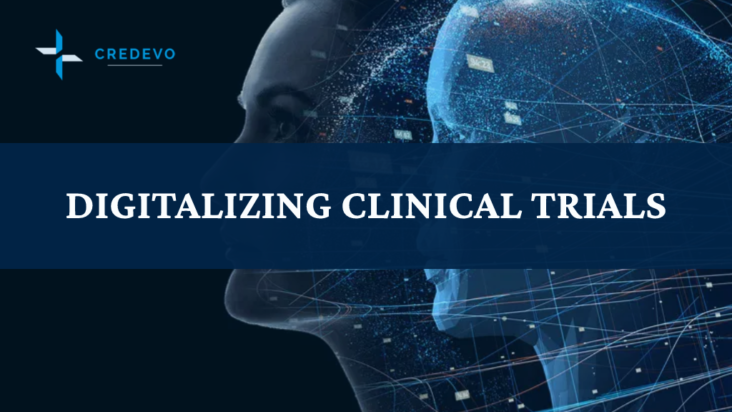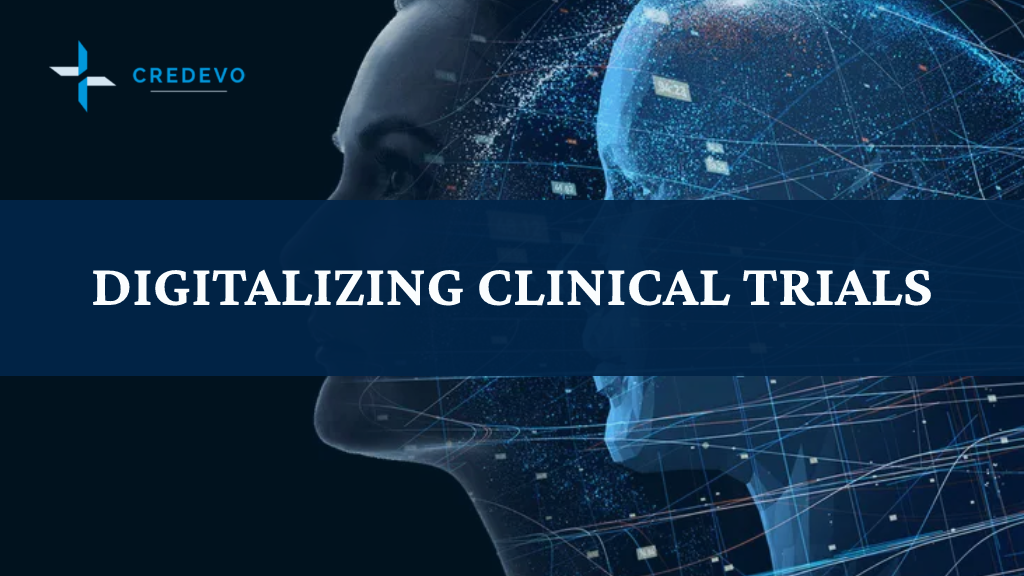Digitalizing Clinical Trials: Why & How?

The concept of a “digital clinical trial” means leveraging digital technology to improve patient and sponsor experience in handling clinical trials using digital tools to manage end-to-end clinical trial solutions. Digital clinical trials also improve participant access, engagement, trial-related measurements, and/or interventions, enable concealed randomized intervention allocation and has the potential to transform clinical trials and lower their cost.

Why are researchers interested in digitizing clinical trials?
Traditional clinical trials are fraught with difficulties that can impede the productive conduct of clinical trials.
- Identification of patients, patient recruitment, data collection, driving up the cost of participants, and increasing burdens leads to low participation in traditional clinical trials.
- Living far from the research site or not having mobility limits the assortment of participants in a trial.
- Their participation can be expensive or even impossible.
Digital clinical trials operate digital technologies to enhance participation access, study-related data, scales, and examinations and have the potential to remake clinical trials and reduce their costs.
When do we call a clinical trial ‘digital‘?
A digital clinical trial uses technology in every step of a standardized clinical trial. Digitalizing clinical trials is a promising and advanced way to handle existing challenges in traditional clinical trials.
U.S. National Institute of Health and National Science Foundation has given their concern for digital clinical trials since they reduce the cost and burden while creating a satisfactory experience for the participants and research team.
There is now an opportunity to leverage digital technology to accelerate knowledge gained through traditional clinical trials. Digital technology can improve the efficiency of clinical trials by empowering and benefiting investigators and trial teams.
A clinical trial can proceed without an in-patient visit. In some digital clinical trials, participants do not meet the investigators, although extensive procedures such as biopsies may require close monitoring by experienced healthcare professionals.
The elements of a digital clinical trial
The elements of digital clinical trial hold right from study design to study conclusion. In this article, we try to cover a few tasks in conventional clinical trials.
- Digital recruitment and retention
- Social media engagement
- Online consent
- Bidirectional communication
- Diversity in recruitment
- Ethical approvals
- Digital health data collection
- Patient-reported outcomes
- Ecological snapshot
- Digital biomarkers
- Wearable and mobile sensor technologies
- Data privacy
- Digital analytics
- Real-world data
- Interoperability
- Machine learning
- Artificial intelligence
- Precision studies
- Targeted interventions
Click here for more details on using digital tools in clinical trials
Digital recruitment and patient engagement in clinical subsidiaries
Recruitment, informed consent, and patient engagement are barriers to the timely completion of traditional clinical trials. Several reasons are possible for the limitation of recruitment rates, lack of clinician participation, and financial difficulties.
Although guidelines exist to conduct new technologies under the informed consent process, Guidelines for patient recruitment are lacking. Such Guidelines are needed to manage social media and other novel communication tools. For example, it might be appropriate to require a review of tweets to use in support of a clinical trial.
In traditional clinical trials, we can see that participant retention is affected. there are multiple reasons for that,
- Concerns about placebos and randomization
- Problems with informed consent forms
- Poor compensation
- Lack of knowledge about clinical trial processes.
Digital technologies have the potential to manage all of these issues. Suggested interventions track applications that enable more efficient contact with participants. Visual formats and videos help take the informed consent. When envisioning payments, they should be made as much as possible with currently available technologies.
Digital health data
When we recruit participants for a clinical trial, we must collect data as part of the study process. Digital data in clinical trials could be,
- Clinical and demographic data
- Captured physiologic and activity data
- E -medical records
- Pictures or videos from smartphones
- Patient-reported outcomes
- Corporal samples
Data collection in digital clinical trials.
Digital health technologies allow measuring the dimensions of participant health characteristics efficiently. Such as,
- Heart rate
- Sleep duration
- Breathing
- Adherence to medications
- Physical activities and many more
Some of these parameters need further evaluation and validation before being used in clinical research.
Nonetheless, digital health technologies offer the research community new tools that can enhance data collection as well as the clinical trial enterprise, including the ability to conduct data collection independent of “fixed” research centre’s.
There are multiple benefits of the digitalization of clinical trials. No matter where participants live or work, a complete digital clinical trial allows potential participants access while providing interactive patient monitoring and assessment system.
Technologies represent a potentially transformative approach, and the need for greater effectiveness has never been more evident than now in the time of the covid 19 pandemic.
Digital surveillance and biomarkers
Digital biomarkers imply pathological, anatomical, physiological, social, or patient-reported measurements that can be composited using digital technologies.
Although many digital biomarkers are still in the validation phase, they might provide detailed information about physiologic processes, diagnosis, dosing, and endpoints for clinical trials in the future; cardiogenic chest wall vibrations to assess the clinical condition of patients with heart failure.
Safety monitoring in digital clinical trials
Since digital clinical trials have become a hot topic in the clinical trial industry, researchers are integrating implements with traditional biomarkers to validate their efficacy and safety.
The possibility of digital implements to gather data constantly and transfer it word-for-word to investigators could enhance the detection of occasional cases that are unlikely to happen during a traditional trial visit.
The speed of identifying and reporting adverse and safety effects are necessary for trial completion on time.
Data analytics
Data from the real world
A truly flexible, extensible, and scalable clinical trial infrastructure that leverages the electronic health record is currently feasible. The health record is approaching some forms of interoperability that will form the foundation for an application-driven data economy.
As part of a computerized real-world data system, data from mobile devices and patient-reported outcomes could evolve regular investigation components and endpoints.
Advanced analytics
Appliance knowledge and artificial intelligence allow the evolution of advanced analytics that can use for different facets of digital clinical trials. For example, we can use automatically derived clusters or subtypes to personalize supervised detection methods and achieve higher detection accuracy.
Similarly, we can use supervised and unsupervised learning methods to detect context and figure out proximal outcomes. These approaches allocate participants in improving digital data extraction and computational phenotyping and support the interpretation of study results.
Optimizing study methods
Digital techniques also lend themselves to several methods, such as micro randomization, to optimize and personalize clinical trial methods.
In addition, we can use these methods to personalize the delivery of such study aids and maximize their effectiveness for each participant.
Data security
Digital health technology has created challenges in maintaining rules and regulations for privacy, security, and ethics. Distant monitoring systems and digital technology enhance the importance of security measures to protect the data when data is collected, transmitted, and stored.
Some measures, such as location data, could set study participants at risk for legal action. For this reason, the FDA has included cybersecurity as a component of medical device certification.
Even as we desire to enhance patient entry, all stakeholders should comprehend the risks and benefits of transferring patient data.
Documenting informed consent must incorporate remote technologies while ensuring it does not interfere with data collection, transmission, disclosure, and sharing.
To conclude, digital trials are changing the face of clinical trials in how trials are efficiently and effectively managed using minimum resources to achieve cost-effective and timely completion of clinical trials. Even regulators like FDA, EMA, Health Canada, etc. are encouraging sponsors to move toward digitalizing their clinical trials by providing various guidance documents for digital tools.
Are you looking to digitalize your clinical trials & accelerate your clinical development process in an effective way?
Connect with us to explore our digital platforms and run your clinical trials effortlessly. Provide your clinical trial details in the below form to connect with us and explore our services.